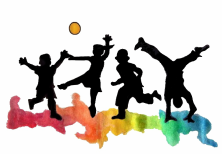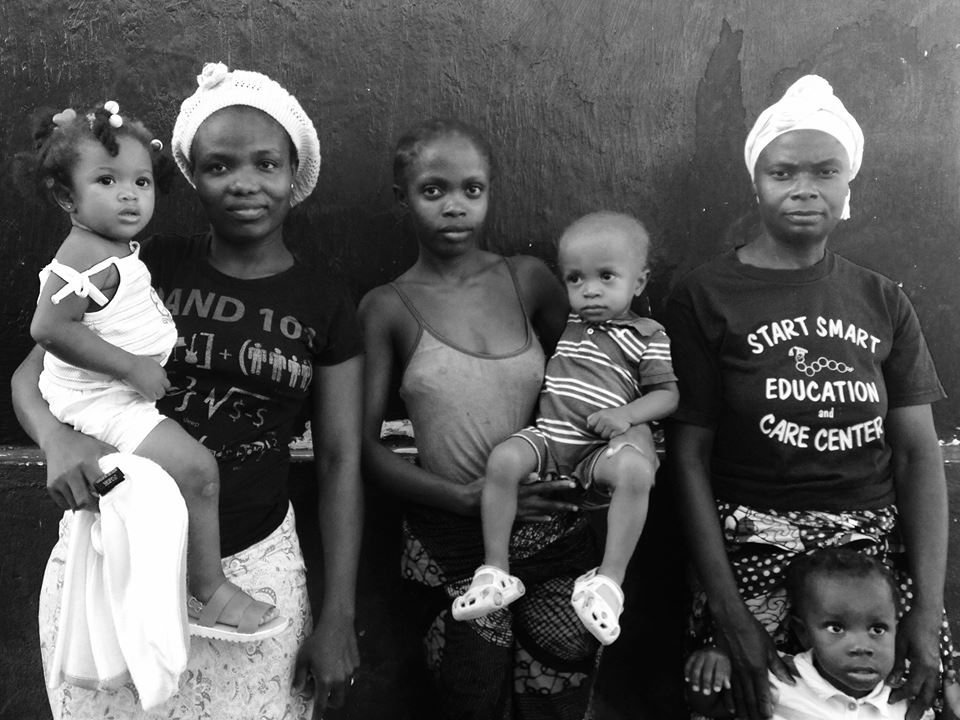|
These three mothers faced Ebola and survived. One of them came down the with disease in late 2014 and survived. Mary returned to her community in Bomi, wearing nothing more than an old shirt, skirt, and pair of flip-flops given to her upon discharge. One of her two children, a young girl, had died of Ebola in the Ebola Treatment Unit (ETU). Her youngest child never contracted the virus and was healthy. He was being cared for by her two female family members (in picture) while she received treatment. She was overwhelmed to again hold him in her arms. In total, nearly a dozen members died in Mary's family- her child, aunts, cousins, a brother. Her nightmare should have been over but it wasn't. When her family took her home, she was met with devastation. Her house had been ransacked by neighbors who presumed most of family to be dead. Little was left except for a used, disinfected mattress on which she had first fell ill and a stool. Her neighbors claimed that everything had been destroyed by the County Health Team, yet she saw several of her possessions in her neighbors' homes. They offered her little help. Worse, they told her that they not want her to return. She was chastised for having been one of the 'cursed' to bring Ebola to the community. Neighbors felt resentful and frightened by her and her direct family members, including her son. "They think I still carry the virus," she explains to a Playing to Live social worker assigned to work in her community. Their belief she can infect others balances between misunderstanding of how the virus works and a common cultural perspective that those infected are spiritually cursed, a state that can be passed on to others by proximity. She can barely form words for what she experienced since returning. Mary says that the stigmatization that she faced at home was almost worse than horror she witnessed while interned in the ETU. After a few weeks upon her return, her husband could take no more. He abandoned her and their child to move to Monrovia to start a new life away from the memories. "When he left, I grew more poor. I had no money [coming out of the ETU]. When my family lent me small [money] to buy things to sell in the market, people came and took my supplies." In broad daylight, random men from the community would burst into her home and rob her meager possessions. She could barely make a living enough to buy food, often having to rely on family members to feed her child. The Playing to Live Social Worker, trained by Renewed Energy Serving Humanity (RESH), reports on his initial visit to the home that Mary's child, Victor, is malnourished and underweight. Neither mother and child have proper clothing. Mary's only shoes are the same flip-flops she was given by the ETU, now broken. When the Social Worker asks about the bruises on her arm and face, she shies away from answering. Some of her neighbors have taken to physically harming her, likely in hopes of warding her away from near their homes. "I just want to pick myself up," Mary cries. The chances of her new life seem lonely and bleak, and now with Ebola ending, her new reality is setting in. The stigmatization that Mary faces as an Ebola survivor is more common than many realize, in Liberia. In a survey conducted by the National Survivors' Network, nearly four in ten survivors reported experiencing horrific stigmatization. 50 percent have lost their jobs as a result of Ebola. One in ten report physical and/or psychological abuse by family or neighbors because of their status as survivors. It should be made apparent that 50-70 percent of people who came down with Ebola did not survive. So being a person who survived is what many call a 'miracle'. Yet instead of being welcomed back as heroes who made the odds, many people who survived are shamed and abandoned by those who once cared for them. The Playing to Live program is trying to support positive change in communities like Mary's. In collaboration with RESH, the Liberian Ministry of Gender Development, and through funding from UNICEF, Playing to Live will work in 40 communities most of which were hot zones during the crisis, supporting households affected by Ebola, reaching in total over 800 children and 150 adults. In each community, a Project Associates (many of whom are Ebola survivors themselves) works with about 20 children in specific households identified as highly affected, meaning one or more people came down with the virus or had family/neighbors who did. Two to three days a week, the Project Associate facilitates play, art, and expressive activities designed to help the children work through their emotional and psychological stress, to develop their resiliency and coping skills. All the materials are provided free of cost. Additionally, a Playing to Live Social Worker conducts frequent visits to each home to monitor the children's wellbeing. Moreover, the Social Worker is trained to provide supportive talks with the parents and guardians of the children, like Mary, to provide them a safe space to share their thoughts and feelings. These parents and guardians will also receive training in caregiving and children's rights, and ongoing mentoring in coping mechanisms that they can use in times of stress. Playing to Live staff additionally liaison with community leaders, such as religious and tribal leaders, teachers, and elected officials, to advocate on behalf of the affected households for community support to combat the stigmatization. "I am excited to have my child play. It is good [Playing to Live] helps us," Mary expresses, holding her son. While there is more that needs to be done to help Ebola survivors, Playing to Live will actively work to support parents and guardians like Mary to make sense of their experiences and to begin the healing process.
0 Comments
Leave a Reply. |
Welcome to Our Blog!
We will be providing you with stories of the communities we support. The children and their caregivers featured in this blog have provided consent to share their art, pictures and stories. Archives
April 2020
Categories |


 RSS Feed
RSS Feed